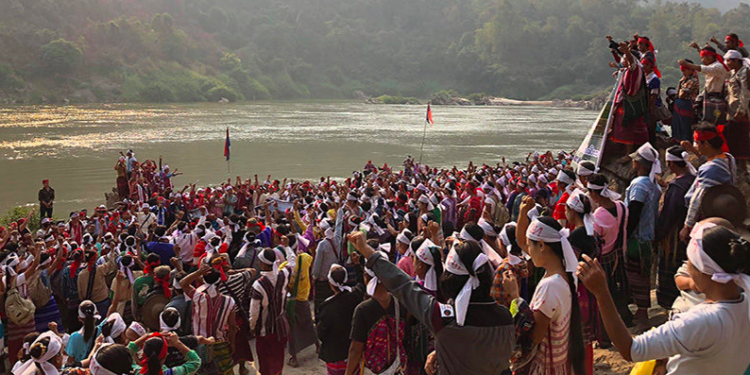YANGON — Local residents are concerned about the lack of transparency surrounding seven proposed dam projects backed by international companies in southern Myanmar, some of which have already resulted in forced displacement, land confiscation and loss of crops without compensation, according to a report by the Karen Human Rights Group (KHRG).
The seven projects are expected to have total capacity of 2,265 megawatts. According to the report, along with the local company Asia World, the major investors are from Thailand, Japan and Norway. Many of the proposed projects are designed primarily to export electricity to Thailand or China. Construction on three of the projects is expected to begin in 2021 and be completed in 2022, the report said.
Speaking to The Irrawaddy, however, the Asia World Group of Companies denied the report’s claim that it was involved, saying it currently has no plans to invest in these projects.
Saw Tha Phoe, a coordinator at Karen Rivers Watch, told The Irrawaddy: “We have no clue about the projects. The [National League for Democracy-led] government hasn’t provided any information. There has been no public consultation with local people.”
According to the report, the proposed dam projects are: Thauk Yay Hkat (1) in Thandtaung Township (120 MW); Hatgyi in Hlaingbwe Township (1,380 MW); Thawkahtar (160 MW) in Kyaukkyi Township; Bilin in Bilin Township (280 MW); Pata in Kawkareik Township (5 MW); Mehkatha in Kyain Seikgyi Township (120 MW); and Tanintharyi in Hteekhee Township (200 MW).
Some companies have started building roads and moving equipment to the dam sites and urged local people to move. Some residents have already been displaced from proposed project sites.
KHRG said Thai and Japanese companies have implemented initial construction and brought in transport equipment for some of the proposed dam projects, destroying villages and farms in Ler Muh Lah Township, Tanintharyi Region.
“People have been displaced from their villages without having a chance to discuss compensation,’’ Saw Tha Phoe said.
KHRG said villagers from five of 10 investigated dam sites have reported cases of land confiscation and property damage. In all of these cases, villagers reported that compensation was not provided for land confiscation, or extensive damage to crops and natural fauna.
“Public consultations were not conducted, and rural ethnic communities were not able to negotiate for compensation,” KHRG said.
According to the report, some of the projects were proposed after the Karen National Union (KNU) and the Myanmar Military signed a bilateral ceasefire in 2012. All of the projects are located in KNU-controlled areas in Karen State, Mon State and Tanintharyi Region.
“Some projects were approved under the previous government. Some were approved under the current government,” Saw Tha Phoe said.
According to KHRG, when the NLD-led government declared its support for hydropower development along the Salween River, military clashes erupted between the Tatmadaw and its aligned Border Guard forces on one side, and the Karen National Liberation Army (KNLA) and Democratic Karen Benevolent Army (DKBA) on the other.
Military confrontations have occurred around the proposed dam sites; from 2014 to 2016 more than 7,400 residents of 35 villages were displaced near the proposed Hatgyi Dam project on the Salween River. If the Hatgyi Dam project is implemented, more than 30,000 people could be displaced from 50 villages upstream of the site, KHRG said.
Of the 50 large hydropower projects implemented in Myanmar to date, 42 are located in ethnic areas, according to KHRG.
The organization urged the government to ensure that implementation and planning of large-scale hydropower projects in ethnic areas is suspended until a comprehensive nationwide peace agreement is reached.
In March, more than 1,700 people living near the proposed Hatgyi Dam on the Salween River gathered to protest against the construction of dams on Myanmar’s biggest rivers, including the Salween, Irrawaddy and others.
Before the proposed projects officially begin, Saw Tha Phoe said, the companies involved should discuss with local communities the payment of adequate compensation. The coordinator also urged the government to disclose all related information in order to demonstrate accountability.
Note: This story was updated on July 18, 2018.

















